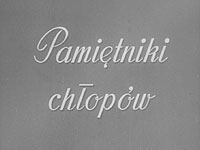 Peasant Diaries
Peasant Diaries
Pamiętniki chłopów
Poland, 1952, black and white, 13 mins
Made the year after the overtly Socialist Realist propaganda film Destination Nowa Huta! (Kierunek – Nowa Huta!), Andrzej Munk’s Peasant Diaries derives from the same tradition, duly adopting many of the same archetypes and clichés (you half expect the ruddy-cheeked peasants harvesting the wheatfields to break into song, along the lines of Ivan Pyriev’s notorious 1949 musical Cossacks of the Kuban River/Кубанские казаки), but overall it marks at least a partial advance on its predecessor.

It was inspired by a 1935 book of the same title, which compiled first-person accounts of peasant life in pre-World War II (and pre-Communist) Poland. By tracking down three of the authors and comparing their lives in 1952 with the situation seventeen years earlier, Munk managed both to meet official requirements and strike out on his own (albeit to a limited extent). Because his subjects’ living standards had dramatically improved across the board, the film became more than acceptable as propaganda, but the subject also allowed Munk the freedom to explore their individual lives.
The first is Andrzej Urban, from Lutcza, a region noted for strikes and similar protests against social injustice. His diaries (or at least the excerpts quoted here) don’t mention this, but instead offer a bleak portrait of his likely future. Which is, of course, thanks to People’s Poland, infinitely rosier than he ever predicted. His son Władysław is an aviation officer, a job considered quite out of his class league in the 1930s (in a nifty visual touch, the plane takes off from one of the wheatfields). His middle son Stanisław is an agricultural agent (“his daily work adds to the unity between towns and villages”), while the youngest, Adam, has stayed at home to help run the farm with his wife – though the fields are now owned by the people rather than the local landowner.
The second is Bronisław Majek, from Babice, a village that has been so transformed since 1935 that only a single old hut survives from the period. His children are much younger, so this part of the film concentrates on the educational opportunities that were denied their father. Wanda has just received a diploma at the end of her seventh year, with university a realistic prospect. By contrast, Bronisław was permitted just three years (which he enjoyed) before being sent out to manual work.

The third is Antoni Dabin, whose 1935 diary talks about deprivation so severe that even matches were a luxury. Needless to say, by 1952 he has attained both electric lighting and a prestigious job (chairman of the production cooperative in Hrynkow), with his daughter taking the various mod cons for granted. The film concludes with images of Dabin’s cooperative carrying out their harvest – all massed tractors and blond combine-harvester operators reaping the golden wheat, while the narrator waxes lyrical about the spirit of brotherly collaboration.
Peasant Diaries would undoubtedly have been a much better, and certainly more immediately engaging film if the three central figures had been allowed to give their own version of events in their own voices. Instead, they’re presented as though they were part of a National Geographic anthropological study, their silent faces accompanied on the soundtrack by actors reading carefully-selected excerpts from their diaries. But it does at least show early signs of Munk’s interest in breaking with the conventional Socialist Realist mould, which would be developed much further in his later documentaries.
- Director/script: Andrzej Munk
- Camera: Romuald Kropat
- Editing: Anna Górecka
- Narration: Tadeusz Olszewski
- Voice-Over: Aleksander Bardini, Józef Nalberczak
- Sound: Bohdan Kajan
- Sound Editing: Alicja Krawczyk
- Production Manager: Jan Lubieniecki
- Production Company: Wytwórnia Filmów Dokumentalnych (Documentary Film Studio)
The film is included on PWA’s Polish School of the Documentary: Andrzej Munk double-DVD set (Region 0 PAL), and the source print is in broadly similar condition to that of Destination Nowa Huta! – in general, it’s been surprisingly well preserved, though there are occasional exposure fluctuations. While the soundtrack is less crackly, the subtitles are also less satisfactory, with numerous typos (“bread” for “bred”) and other linguistic infelicities – though these don’t detract seriously from appreciation, and are at least properly synchronised. As for online commentary, this Culture.pl overview of Munk’s career has a short paragraph on Peasant Diaries.